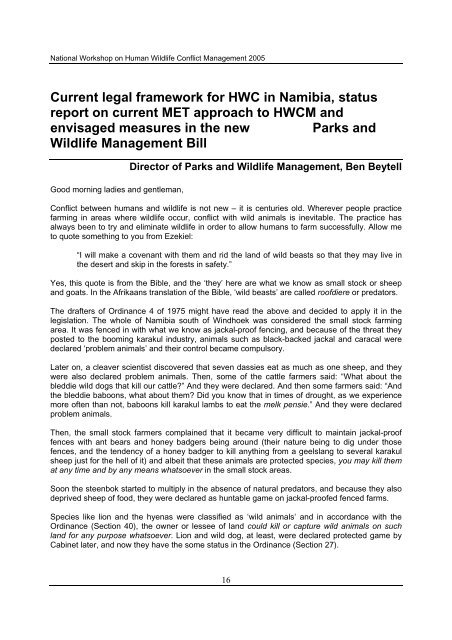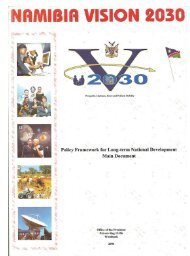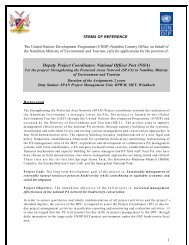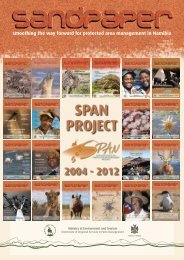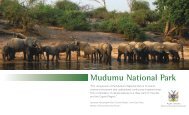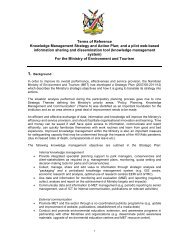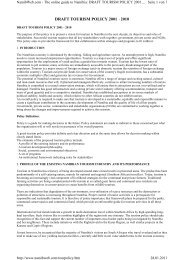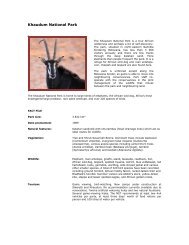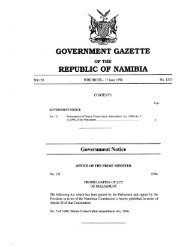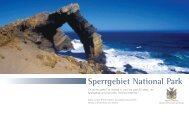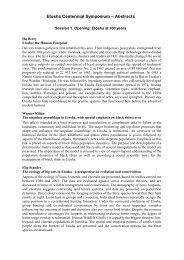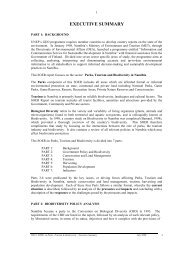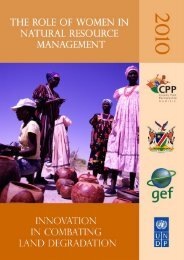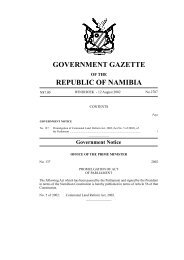HWCM - Ministry of Environment and Tourism
HWCM - Ministry of Environment and Tourism
HWCM - Ministry of Environment and Tourism
Create successful ePaper yourself
Turn your PDF publications into a flip-book with our unique Google optimized e-Paper software.
National Workshop on Human Wildlife Conflict Management 2005<br />
Current legal framework for HWC in Namibia, status<br />
report on current MET approach to <strong>HWCM</strong> <strong>and</strong><br />
envisaged measures in the new Parks <strong>and</strong><br />
Wildlife Management Bill<br />
Good morning ladies <strong>and</strong> gentleman,<br />
Director <strong>of</strong> Parks <strong>and</strong> Wildlife Management, Ben Beytell<br />
Conflict between humans <strong>and</strong> wildlife is not new – it is centuries old. Wherever people practice<br />
farming in areas where wildlife occur, conflict with wild animals is inevitable. The practice has<br />
always been to try <strong>and</strong> eliminate wildlife in order to allow humans to farm successfully. Allow me<br />
to quote something to you from Ezekiel:<br />
“I will make a covenant with them <strong>and</strong> rid the l<strong>and</strong> <strong>of</strong> wild beasts so that they may live in<br />
the desert <strong>and</strong> skip in the forests in safety.”<br />
Yes, this quote is from the Bible, <strong>and</strong> the ‘they’ here are what we know as small stock or sheep<br />
<strong>and</strong> goats. In the Afrikaans translation <strong>of</strong> the Bible, ‘wild beasts’ are called ro<strong>of</strong>diere or predators.<br />
The drafters <strong>of</strong> Ordinance 4 <strong>of</strong> 1975 might have read the above <strong>and</strong> decided to apply it in the<br />
legislation. The whole <strong>of</strong> Namibia south <strong>of</strong> Windhoek was considered the small stock farming<br />
area. It was fenced in with what we know as jackal-pro<strong>of</strong> fencing, <strong>and</strong> because <strong>of</strong> the threat they<br />
posted to the booming karakul industry, animals such as black-backed jackal <strong>and</strong> caracal were<br />
declared ‘problem animals’ <strong>and</strong> their control became compulsory.<br />
Later on, a cleaver scientist discovered that seven dassies eat as much as one sheep, <strong>and</strong> they<br />
were also declared problem animals. Then, some <strong>of</strong> the cattle farmers said: “What about the<br />
bleddie wild dogs that kill our cattle” And they were declared. And then some farmers said: “And<br />
the bleddie baboons, what about them Did you know that in times <strong>of</strong> drought, as we experience<br />
more <strong>of</strong>ten than not, baboons kill karakul lambs to eat the melk pensie.” And they were declared<br />
problem animals.<br />
Then, the small stock farmers complained that it became very difficult to maintain jackal-pro<strong>of</strong><br />
fences with ant bears <strong>and</strong> honey badgers being around (their nature being to dig under those<br />
fences, <strong>and</strong> the tendency <strong>of</strong> a honey badger to kill anything from a geelslang to several karakul<br />
sheep just for the hell <strong>of</strong> it) <strong>and</strong> albeit that these animals are protected species, you may kill them<br />
at any time <strong>and</strong> by any means whatsoever in the small stock areas.<br />
Soon the steenbok started to multiply in the absence <strong>of</strong> natural predators, <strong>and</strong> because they also<br />
deprived sheep <strong>of</strong> food, they were declared as huntable game on jackal-pro<strong>of</strong>ed fenced farms.<br />
Species like lion <strong>and</strong> the hyenas were classified as ‘wild animals’ <strong>and</strong> in accordance with the<br />
Ordinance (Section 40), the owner or lessee <strong>of</strong> l<strong>and</strong> could kill or capture wild animals on such<br />
l<strong>and</strong> for any purpose whatsoever. Lion <strong>and</strong> wild dog, at least, were declared protected game by<br />
Cabinet later, <strong>and</strong> now they have the some status in the Ordinance (Section 27).<br />
16


